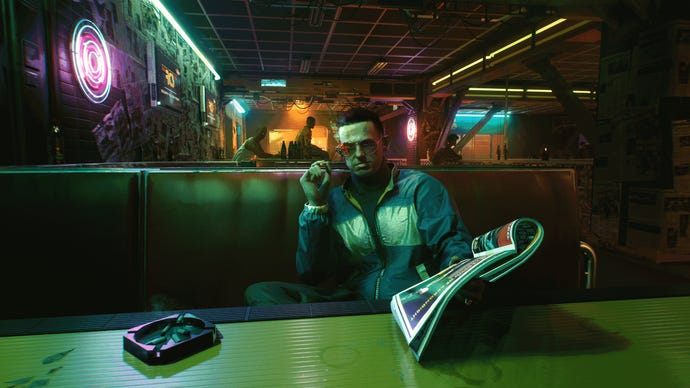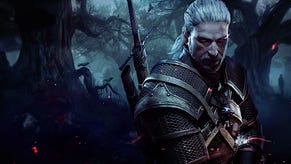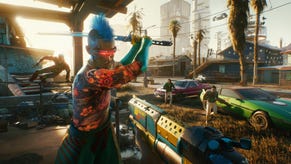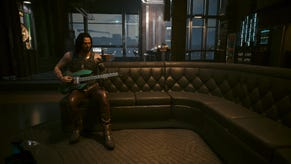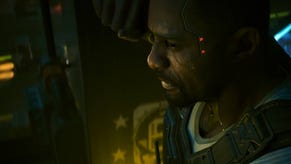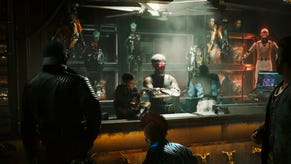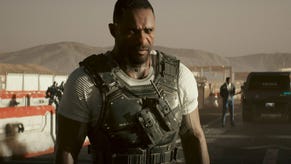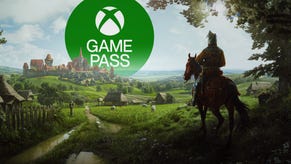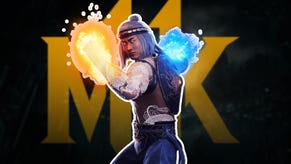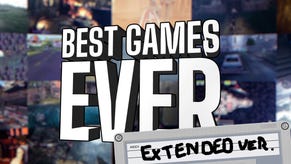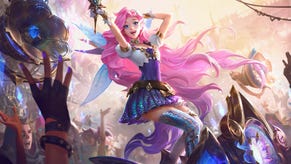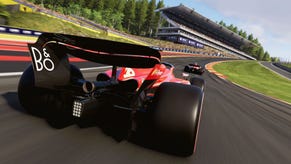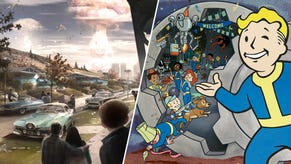Cyberpunk 2077 interview - choice and consequence in a morally murky world
We talk narrative design, branching storylines and character origins in Cyberpunk 2077.
After four hours hands-on, the game mechanics and systems of Cyberpunk 2077 very much speak for themselves. One thing that's harder to get to grips with in such a play session is the story: after experiencing those four hours, I hadn't even really broken out of the prologue.
CD Projekt RED makes huge games, of course. The Witcher 3 is absolutely gigantic, and Cyberpunk 2077 appears to be even bigger. That brings with it interesting story challenges - like making sure there's a sensible split between story content and side quests, and balancing out a huge number of branching storylines that can twist and turn into a complicated knot to form your unique cyberpunk story.
After our hands-on, we had a chance to hop on a call with Tomasz Marchewka, lead story writer at CD Projekt RED. Our chat covers much about the process of crafting a story for a game as huge as Cyberpunk 2077 - from time-limited dialogue choices to character origin stories and, of course, the challenge and joy of environmental storytelling in an open world. Here's out chat in full.
VG247: I want to start with - well, I should mention that I did the Street Kid path at the start of the game.
Tomasz Marchewka: Don’t tell anyone, but that’s my favourite.
VG247: Well, this is what I want to ask you about. How does that work? The impression that I got is maybe that that initial start of the game, up until the point where you meet Jackie is maybe different for each one, and then things will come back together into one story path, and then perhaps it’ll branch out later on to give you more options. How exactly does that work?
Marchewka: Yes, so, maybe I’m going to just start with describing shortly what I do at CDP, because that will give you my perspective, why I’m describing things the way I do. My name is Tomasz Marchewka. I’m lead story writer at CDP Red, which means I manage one of our writing rooms. I’ve got a few writers that I work with on a daily basis, which means I give feedback on their dialogue, but I’m also one of the writers responsible for the game. So, I’m not only leading or just sharing the vision from the directors to the team, I’m also responsible for writing certain quests. Every writer at CDP gets some part of the content which he or she is responsible for. We write everything, from the story synopsis through the quest breakdown, with the rest of the narrative team, of course. So, quest design, level design, cinematic design, and many other people. And later on, we are responsible for the dialogue, and pretty much everything that is written down on the screen, from the small things you’ll find in the world up to the point when you are putting the volume up or down - we also put those menus in.
So, yes. Getting back to your question. That’s the tricky part, to be honest, because it all started with defining V as a character. We wanted to give you as much freedom as we could, so you can decide what kind of cyberpunk you’re going to be. You can choose how you look, who you are, to some extent, and so on. But we wanted you still to be a cohesive person, like a person who would be alive, not doing stuff from totally different angles. So, you still seem to be the same character. And after that, we decided, ‘Okay, now we’re going to have three different origin stories, and three different approaches to how you’re going to perceive the world around you.’ Because, well, past experience gives you some point of view, which may affect the way you interact with some types of situations.
You chose the Street Kid, so let’s go with this one. If you are the guy who came from a specific environment, you’re going to understand how the street works. For example, that gang environment is going on according to some rules. You always answer to someone, who is answering to someone, and so on. It’s a world full of connections between gangs, but also between corporations, politics, and so on. So, you understand it from the ground level. And this gives you a unique approach to situations which are going to involve that ecosystem. Because for some people, it might just seem to be chaotic, but you know how it works. And on the other hand, if you’re a Corpo, you understand the game of power. So, you will understand situations, for example, when someone is bluffing, pretending to be more powerful than he or she actually is. So, for example, you know that no one is standing behind you, because if they were, you wouldn’t be asking me questions. You would just take me, for example, to a corporate centre, and then interrogate me. And so on, and so on.
So, to expand also on what you asked about, it starts with a different origin story, and each of those characters, if I may say ‘characters’, each of those life paths, met Jackie in a different way. But at some point in the plot, they just merge into one story where you start to be friends, at some point of the prologue. You’re already friends, and then you are continuing with the same story.
VG247: And so, once you’re in that story, do the life paths have any impact? Obviously, you’ve got the choices, I know, but is it going to be the case perhaps where there might be Corpo-exclusive sidequests that come from the background of the Corpos, and so on? Or are you just going for, it’ll open up dialogue options?
Marchewka: I don’t want to spoil too much. There are going to be some things which are exclusive to life paths, but we mostly base it on choices.
VG247: Awesome. One thing that always piques my interest, because not many RPGs have the balls to do this, but you’ve obviously got time limits on some of your dialogue choices, where you have to make a quick call. From a writing perspective, how do you feel about putting that in? Was that difficult to put in, to work out?
Marchewka: I must say it was a shift of perspective for me. I think that for me personally, it allowed me to grow as a writer, because my background is writing novels. I wrote two of them. I write lots of short stories. When you are writing a game, you have to think about immersion, players’ motivation, and so on, and so on. And now, we have to think about the different tempo. This is a situation in which the time of reaction might change the outcome, but it also adds to a very important thing, which is suspense.
So, you’re using different tools, and those tools are not purely based on time, they are also based on visuals. They are based on staging. So, you have to be aware what the composition of every character is. So, for example, how are they standing? Why is the tempo important in that scene? And then you go back on paper, and you have to think about how this whole scene is designed around the tension, and what’s the tipping point, and why do you feel emotions in this one? And is giving your time choice, as you named it, is it justified? And if it’s going to adapt to a scene, and when to use it. Sometimes just a small favour, like someone wants to insult you, and you’re either talking back, or just staying silent, and both of the reactions can have consequences. But sometimes, it might be a life or death situation, you know.
VG247: Do you feel like having that in changes the way that players play the game, from what you’ve seen with playtesting? Do you feel like it forces them to make those compulsive decisions, rather than sit there and think about it for five minutes?
Marchewka: I never thought about it that way. I hope that it gives you the impression that not doing stuff matters, because it’s the same impact on the story as doing stuff. So, you have to watch out for what happens. I think it deepens the immersion, because it gives your choices, your actions, an additional level of weight. That basically, if I stop being focused on what’s happening, it might go the other way around. And it’s not about being on the spot. It’s not about looking for a choice. It’s about being in the scene.
VG247: I notice when you’ve got quest-givers and stuff like that, you’ve got... I guess I would say investigate options, and then you’ve got your compulsory options. The investigate stuff is highlighted in blue, and that’s the stuff that might give you more information on the quest. How do you try and make sure that people get the information they need from the compulsory options, while still making the investigative options interesting?
Marchewka: Hm. That’s a tricky question. To be honest, I always try to write the scene in the way that it feels the most natural. So, I concentrate less on the balance between giving too much information or not enough - Well, of course there’s always proofreading if that conveys what you wanted to say.
But at the same time, for me, the trickiest part is to write the informative part in the way that it still seems to be a natural dialogue. Because it’s not supposed to be a wall of text. So, if this conversation would actually take place in the situation like that, which might be tense, which might be full of suspense and so on, would those guys speak in that way? Would they be as tense as they are in the, as you quote, compulsive situation. And suspense is only one of the tools, of course. Some situations require other narrative approaches to them. But still, when I write, and I know that a lot of our writers do it the same way, it must feel natural, and it must be interesting, and get you inside from the first to the last word, because we don’t want to give you any redundant stuff.
VG247: Aside from the bonus of the extra information you get, and the extra insight into the world you get, is there an incentive for players to take their time and go deep, and have these conversations? For instance, if on a quest, you go and ask about every aspect from the quest giver, everything you can possibly get from them, is that potentially going to give you an advantage, either informationally, or perhaps you might have more information on your heads-up display, as you go into the body of the quest?
Marchewka: I’m not sure about the heads-up display, to be honest, but for sure it’s going to give additional information about other characters’ motivations. It’s like, because you played the Street Kid, yes, so you obviously are referring to the Dex situation and so on. So, it’s like, because of your street smarts, because of where you come from, you can ask some questions other people wouldn’t be able to. So, Dex as a character seems to be – well, you can suddenly understand his motivation from the very beginning, but only if you pry for the additional questions. Of course, after you spend some time in the game, and you know what his subplot is, and so on, and why is it that way, the whole info emerges if you were attentive to details. And we wanted to put some parts in the game where, basically, you will understand everything that’s happening on the screen, but some hidden motivations will come out for you, just only after asking additional questions, or searching for additional info in the game.
VG247: Well, that goes right into something else I want to talk about, where obviously you’ve got the cool stat, and you’ve got the classic RPG tradition of having speech checks. So... if you are mega, mega-cool, and you can talk your way through most things, and talk your way to a lot of extra information?
Marchewka: No, I wouldn’t say so. To be honest, I’m not sure if the cool stat changes the flow of dialogue that much, because we are not basing them on stats. We are purely basing it on your choices.
VG247: Okay. When you say, ‘based on choices,’ obviously you’re tracking within an individual quest the choices people are making, but are you tracking at a world level what sort of person any given person’s V is? Do characters change how they react based on the actions that V has taken over the course of the game?
Marchewka: Yes, we try and make the world react to whatever you do. So, for example, because out of many situations, you might go peacefully, you may go in with guns blazing, and so on. It seems like a small thing, but for example, sometimes, if you decided that you want to fight, the scene which follows, and maybe not another scene in the game, but in another quest, will react to that, because they’re going to refer to the fact of what you did. They might call you soft. They might tell you that, well, you are a dangerous person, so they need to watch out for you. So, there are going to be consequences of what you do, and while it seems small, if you multiply it by the number of scenes where it could happen, it gives a good impression of the world reacting to whatever you do, and you being a certain type of person.
VG247: You guys make absolutely enormous games, and this seems like it’s ridiculously large. It always feels reductive to ask something like this, but given that you were overseeing the entire story, I’m curious. Just how big is this, by a yardstick, compared to the Witcher 3, in terms of writing? How large of a project is it for you guys? Because it seems ridiculously big.
Marchewka: I don’t know if anyone counted that yet. I’m just going to tell you it’s ridiculously big. It’s enormous. It’s super hard to even say how big it is, because of the size of the open world, because it’s layered, you know. We always use this metaphor to explain this. In Night City, stuff happens on different levels. So, filling it with content, regarding main story, open-world, side content, and so on, this game is just huge.
VG247: I want to ask about critical path versus sidequests. From a story perspective, what’s your philosophy? Because in a game like this, and indeed in The Witcher 3, it’s very easy to play the first third of the story, and then meander off on sidequests and never come back to the main story. Have you guys tried to build it and write it in such a way where you want to try and get people through that main story, or are you happy for things to be structured in a similar way to The Witcher, where people can just abandon that if they want, and just go in search of sidequests?
Marchewka: I can only speak for myself, to be honest, because I never perceived it that way. I always thought that we must give you, you meaning the player, the best possible experience you want to get. If you are the type who wants to explore the world, just live through Night City, we need to be sure that whatever you find on your way is exciting, gives you the feeling that you are actually interacting with a real world, that it doesn’t feel like a video game. I like to say that you cannot see the invisible world, you know.
So, it’s the same approach with the main story, and the- we call it side content, but everything which is around the main story. Good main story doesn’t work in an open-world game without a world to take part in. And the open world itself, also, seems to be a much more lively place if it interacts with stuff which happens in the main story. So, those things are kind of impossible to disconnect, if we want your experience to be as good as possible.
VG247: You mentioned there the qualities of a good open world. And what strikes me is, you’ve got this world that exists for game design reasons, but it seems like the story is really embedded into that world. It seems like there’s quite a lot of environmental storytelling. So, again, from a writing perspective, what was that like in terms of interacting with the art guys, and the world design guys, to try and make sure the architecture of the story you wanted to tell was in there?
Marchewka: For me, that was one of the most exciting parts, to be honest. I think that every writer has his or her own artistic obsession, and mine is cities. I find that stories told by cities themselves are quite unique. Night City gave us the unique opportunity to design a city of the future. And what I mean by that is, for example, take factions. We were not thinking about factions fighting each other because we needed them to fill the open world. We were thinking about people living in Night City. Or we were thinking about gangs, not in the way that they wear specific colours, or use specific weapons, or even have specific ideology. We were asking ourselves questions. What makes people join this particular faction? Why do you end up in this place, or Night City, and not in a different one? How do districts interact with each other? Why is there tension between one group and another, not only gangs, but Corpos? And so on.
It was like designing a whole system which needs to feel real when interacted with. There are a lot of things we just designed, and wrote, and that are on paper for our designers, but it turned out that you only see the tip of it while playing the game. But the knowledge about how it would work, what would work in real life, it gives you the feeling of depth, that this is only the end of the whole reasoning process behind it. So, designing Night City was one of, I think, the most challenging and the most rewarding things in Cyberpunk 2077.
VG247: You can see that passion in what’s delivered in the city. Like I said, you can feel that you are the blood cells going through the veins of the city, so to speak.
Marchewka: And, you know, it’s quite funny, because for example, I’m not very good with visuals. I try not to imagine stuff I’m writing. It’s a personal thing. I remember that the first time I walked through the streets of Night City, it was a total wow factor for me, because I saw those things on paper, but in a game, that really gave me the feeling I was aiming for while designing stuff I was responsible for. I’m really proud of what we did here. I think that the whole team made an amazing effort.
VG247: But media in this sort of setting, it’s quite often used to offer up some moral teachings, and get players, or readers, or watchers, to think about some moral questions. Is that something you guys are approaching with this, where you had topics in might you wanted to touch on, where the Cyberpunk world can have relevance to the real world? Or do you view the game as more morally agnostic, where you want players to just figure that out on their own?
Marchewka: Well, I think that what we were aiming for was to give you the most comprehensive experience of being in a cyberpunk world. And cyberpunk as a genre is about certain things. Some of them might be dark, greedy, and so on. And if you want to make a cyberpunk game which is faithful to the genre, which is faithful to the source material, which is 2020 moved forward fifty years or so, you have to talk about certain topics, because the genre is about those topics.
So, we are always aiming about something which seems comprehensive, which seems real, and which is simply a work of art, so it might pose important questions.
